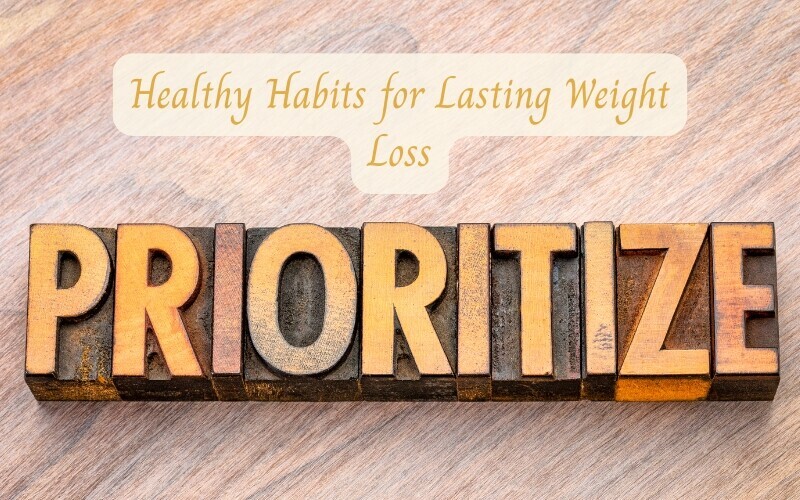You want to lose weight and keep it off. That means building habits that last, not just quick fixes. Today we will talk about Sustainable Weight Loss: 12 Key Habits that can help you stay on track:
Sustainable Weight Loss: 12 Key Habits
Weight loss isn’t about quick fixes—it’s about creating consistent, sustainable habits that support your body and mind. These 12 simple and effective lifestyle changes can help you lose weight and keep it off for good.
1. Choose Whole, Nutrient-Rich Foods
Whole foods like fruits, vegetables, lean proteins, and whole grains provide your body with the vitamins, minerals, and fiber it needs to stay healthy and feel full.
These essential nutrients help you feel full longer. They naturally support your metabolism and prevent overeating.
Choose fresh fruits, vegetables, lean proteins, whole grains, and healthy fats instead of packaged or fast food to balance your blood sugar and keep cravings under control.
- Focus on eating lean proteins, whole grains, fruits, and vegetables.
- Limit processed foods and added sugars.
Nutrient-dense meals also support your metabolism, digestion, and energy levels—also important for weight loss.
When your body gets the nutrition it needs, you’re less likely to overeat.
Start by making small swaps, like brown rice instead of white rice or try snacking on fruit instead of chips or cookies.
Quick Tip: Avoid processed foods high in sugar and sodium.

2. Practice Smart Portion Control
You need more than eating healthy foods. Healthy is great—but eating too much can still lead to weight gain. Portion control means enjoying the right amount of food for your body’s needs. Try using smaller plates, read labels, and serve reasonable portion sizes.
Pay attention to hunger cues. Eat slowly. Your hunger and fullness signals help you recognize when you’re full.
Portion Control Ideas:
- Half your plate: vegetables
- Quarter of your plate: lean protein
- One-fourth of your plate: whole grains
Avoid eating straight from a bag or box. Many people eat – when they are already full – out of habit or boredom. By slowing down and serving less, you can still enjoy your meals without going overboard. Over time, this simple habit can make a big difference in long-term weight loss.

3. Drink Plenty of Water Daily
Sometimes we think we’re hungry when we’re actually just thirsty. Drinking water before meals can help you feel full and prevent overeating.
Water boosts your metabolism, helps with digestion, and reduces hunger. Sometimes thirst feels like hunger—so drink water first when you feel a craving coming on.
- Throughout the day, drink plenty of water.
- Replace sugary drinks with water, herbal tea, or infused water.
Choose water over sugary drinks, which add empty calories. If plain water feels boring, try adding lemon, cucumber, or berries for a little flavor.
Drinking enough water:
- Supports digestion
- Flushes out toxins
- Helps your body burn fat more efficiently
It’s a simple, low-cost habit that supports your health in many ways.
Goal: Drink 6–8 cups of water per day – more if active.
4. Eat Slowly and Mindfully
Slow down and focus on your meal. Chew thoroughly, enjoy the flavors, and stop when you’re full. Avoid distractions like TV or smartphones.
Mindful Eating Benefits:
- Better digestion
- Less overeating
- More enjoyment
Pay full attention to your meals with no distractions from TV, phones, or multitasking. Enjoy the aromas, colors and flavors of each bite!
Take your time to chew, enjoy the flavors, and listen to your body’s signals. When you eat slowly, you give your brain time to recognize when you’re full. This helps prevent overeating and makes meals more satisfying.
Try putting your fork down between bites and focus on the experience of eating. You may find that you eat less but feel more content.
Mindful eating also helps you appreciate food and build a healthier relationship with eating over time.

5. Move Your Body Regularly
Exercise doesn’t have to be intense—walking, gentle strength training, or swimming all count. Aim for 30 minutes of movement most days.
Ideas for Movement:
- Walk around your neighborhood
- Try chair yoga videos
- Use light hand weights
- Include strength training to build muscle and boost metabolism.
You don’t need intense workouts to lose weight—just aim to move more throughout the day. The American Heart Association recommends 150 minutes of moderate exercise per week.
Regular physical activity burns calories, boosts your mood, and helps preserve muscle as you age. Walking, swimming, gentle strength exercises, or stretching are all great options.
Find something you enjoy and try to do it most days of the week. Even 15 to 30 minutes a day can make a big difference over time.
Staying active improves sleep, reduces stress, and supports heart health.
Think of movement as a gift, not a punishment, to your body.
6. Make Sleep a Priority
Poor sleep leads to sugar cravings and slower metabolism. Aim for 7–8 hours of quality sleep per night. Create a calming bedtime routine and avoid screens before bed.
Sleep Tips:
- Go to bed at the same time nightly
- Limit caffeine in the evening
- Dim lights after dinner
Getting enough good-quality sleep is often overlooked when it comes to weight loss. When you’re tired, your body craves sugary, high-calorie foods to boost energy.
Poor sleep can also slow your metabolism and make it harder to manage hunger.
Try to keep a regular bedtime and create a relaxing evening routine—turn off screens, dim the lights, and avoid caffeine before bed.
Sleep helps your body heal, think clearly, and manage weight more easily.
Think of it as recharging your health every night.
7. Reduce Stress in Healthy Ways
Chronic stress can cause emotional eating and weight gain. Calm your mind with deep breathing, stretching, or gentle activities like gardening or tai chi.
Simple Stress Reducers:
- Daily deep breathing
- Journaling
- Listening to music
- Connecting with a friend
Chronic stress triggers cravings for comfort foods and raises hormones like cortisol, which can make it harder to lose belly fat. Finding healthy ways to manage stress is key.
When you handle stress in healthy ways, you’re more likely to stay on track with your weight loss goals and feel better both mentally and physically.
8. Plan and Prepare Your Meals
Having a plan makes healthy eating easier. Cooking at home more often and preping meals in batches – planning ahead – helps you avoid last-minute unhealthy choices. Keep healthy snacks on hand to curb cravings.
Meal Prep Tips:
- Plan 3–5 meals ahead
- Use a grocery list
- Read food labels to make informed choices.
- Avoid grocery shopping when hungry to prevent impulse buys.
Planning your meals ahead of time helps you make healthier choices and avoid last-minute temptations.
Take a little time each week to write down your meals and grocery list. You can even prepare a few meals in advance to save time and stress during the week.
Homemade meals are usually lower in calories, sugar, and unhealthy fats than restaurant or takeout food. You’ll know exactly what’s in your meals, and you’ll be less likely to grab something unhealthy when hunger strikes.
Pre-planning meals also helps you stick to your weight loss goals with less effort.

9. Stick to Consistent Eating Habits
Eating at regular times helps you maintain your energy level and keeps your blood sugar levels stable. Balanced meals throughout the day increase your metabolism and reduce the risk of binge eating.
Avoid skipping meals, which can lead to hunger and poor food choices later.
Consistency Tips:
- Eat breakfast daily
- Maintain a regular meal and snack schedule.
Eating at regular times each day helps keep your metabolism active. Skipping meals can lead to overeating later and mess with your body’s natural hunger signals.
Try to eat balanced meals and healthy snacks around the same time each day.
Consistency also makes it:
- Easier to plan meals
- Avoid impulsive choices
- Listen to your hunger cues
Think of it as setting a rhythm for your body—one that supports your energy, digestion, and weight loss over the long term.
10. Track Your Progress and Stay Accountable
Another healthy habits for long-term weight loss is keeping track of your progress. Tracking helps you celebrate small wins and make changes when needed—both of which are key to long-term success.
What to Track:
- Meals and snacks
- Water intake
- Mood and energy levels
How to Track Your Food Intake:
Use a food journal or an app to monitor habits.It helps you stay motivated and notice what’s working for you.
You can write down what you eat, how much you move, or how you feel each day. You may not need to count every calorie — just having a journal, an app, or a checklist can help you monitor your habits.
- Take progress photos to see changes over time.
- Weigh yourself occasionally, but focus on overall well-being, not just the scale.
The Benefits of a Support System
A support system, whether friends, family, a health coach, or an app, these can all boost your feeling of accountability. They can cheer you on and help you stay focused.
Sharing your goals with a friend or support group increases your motivation.
11. Enjoy Food and Allow Some Flexibility
A strict diet can lead to frustration and burnout. Healthy eating should include your favorite foods—in moderation. Allowing small treats helps prevent feelings of deprivation.
Flexible Eating Tips:
Focus on balance—eat nutritious meals most of the time and enjoy your favorite foods in moderation. Follow the 80/20 rule: 80% healthy, 20% treats
- Don’t label foods as “bad”
Healthy eating doesn’t mean giving up everything you love. Find healthy versions of your favorite foods to enjoy without guilt.
Allow flexibility in your diet. It helps you stick with your habits for the long haul.
When you stop labeling foods as “good” or “bad,” it’s easier to build a positive relationship with eating.
Remember, balance is key to sustaining long-term habits. One indulgent meal won’t ruin your progress.
Long-term weight loss is about consistent habits. Enjoy the process.
Weight loss is a journey, not a race.
12. Set Realistic and Achievable Goals
Setting achievable goals helps you stay focused and motivated.
- Set small, specific goals instead of aiming for drastic changes.
- Adjust goals as needed to stay on track without feeling overwhelmed.
Start small and build over time. Focus on habits, not just the number on the scale.
Goal Setting Ideas:
- Add one vegetable to each meal
- Cook three meals at home this week
- Walk 20 minutes a day
- Try to lose 1-2 pounds a week
Focus on gradual, steady progress, not quick results. Over time, these small steps add up to big changes. Real success comes from steady effort, not quick fixes.
When goals feel doable, you’re more likely to stick with them. These goals are easier to achieve and maintain.
Celebrate non-scale victories. It is the small, consistent steps that bring about the most lasting results.
Sustainable Weight Loss: 12 Key Habits
Quick Habit Overview Table
| Habit | Benefit |
|---|---|
| Eat Whole Foods | Supports Metabolism |
| Portion Control – Use Smaller Plates | Prevents Overeating |
| Stay Hydrated – Drink Water | Aids Digestion – Reduces Hunger |
| Mindful Eating – No Distractions! | Prevents Mindless Snacking |
| Regular Exercise – Daily Walk | Burns Calories – Boosts Your Mood |
| Quality Sleep – Keep a Regular Bedtime | Reduces Cravings |
| Stress Management – Try Deep Breathing | Prevents Emotional Eating |
| Meal Planning – Prep Meals on Weekends | Encourages Better Choices |
| Consistent Meal Times – Keep a Schedule | Stabilizes Blood Sugar |
| Track Your Progress – Use a Journal or an App | Build Awareness and Motivation |
| Be Flexible – Allow Occasional Treats | Prevents Burnout |
| Set Realistic – Small, Clear Goals | Increase Long-Term Success |
Statistics
Statistics can provide valuable insights into the effectiveness of adopting healthy habits for long-term weight loss. Here are some key findings:
1. Habit Formation Duration
Research from the University of South Australia indicates that establishing a new habit typically takes about two months, with significant variations among individuals.
The study analyzed data from over 2,500 participants across 20 previous studies on healthy habit formation, such as regular exercise, daily flossing, and drinking water.
Results showed that it can take between 106 to 154 days on average for a habit to become automatic, although extremes ranged from as few as 4 days to as long as 335 days.
Factors influencing success include the frequency of the activity, the timing, and whether the individual enjoys the new habit.
2. Success Rates of Habit-Based Weight Loss Interventions
A study published in the International Journal of Obesity evaluated the effectiveness of weight loss based on principles of habit formation. The findings suggest that habits can be effective for weight loss and maintenance.
3. National Weight Control Registry Insights
The National Weight Control Registry (NWCR) tracks over 10,000 individuals who have lost at least 30 pounds and maintained the loss for at least one year.
Data from the NWCR reveals that 98% of participants modified their food intake, and 94% increased their physical activity to achieve weight loss.
Additionally, almost all members ate breakfast regularly and weighed themselves frequently, highlighting the importance of consistent healthy habits in long-term weight management.
These statistics underscore the significance of developing sustainable habits for achieving and maintaining weight loss. By focusing on gradual, consistent changes, individuals can create a lifestyle that supports long-term health and well-being.
Final Thoughts on Sustainable Weight Loss: 12 Key Habits
Losing weight and keeping it off isn’t about strict diets or temporary fixes. It’s about creating lifelong habits that support a healthy and balanced lifestyle.
By eating nutritious foods, exercising regularly, managing stress, and staying consistent, you can achieve lasting weight loss. Small, steady changes lead to long-term success.
Start with one or two new habits today, and over time, they will become part of your daily routine. Your health is a lifelong journey—embrace it with confidence!
Would you like more personalized tips on creating a weight loss plan that fits your lifestyle? Let me know in the comments.
Sources:
- Harvard Health: Healthy Weight Loss
- Mayo Clinic: Weight Loss Basics
- CDC: Healthy Weight
Disclaimer: If you have any concerns or questions about your health, you should always consult with a physician or other healthcare professional. No content on this site should be substituted for direct medical advice from your doctor or another qualified healthcare practitioner. The information contained here is for informational purposes only. It is from my research and personal experience.
Related Posts
16 Secret Habits of People Who Lose Weight and Keep It Off
An Exercise Plan for Seniors to Keep Moving
17 Ways to Keep Motivated as You Keep Getting Fit

